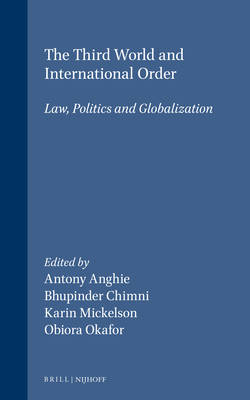
- Afhalen na 1 uur in een winkel met voorraad
- Gratis thuislevering in België vanaf € 30
- Ruim aanbod met 7 miljoen producten
- Afhalen na 1 uur in een winkel met voorraad
- Gratis thuislevering in België vanaf € 30
- Ruim aanbod met 7 miljoen producten
Zoeken
The Third World and International Order
Law, Politics and Globalization
€ 244,45
+ 488 punten
Omschrijving
This collection of essays explores different dimensions of the relationship between the third world and international law. The topics covered include third world approaches to international law, non-state actors and developing countries, feminism and the third world, foreign investment, resistance and international law, and territorial disputes and native peoples. It is a further contribution to the work done by scholars intent on elaborating what might be termed Third World Approaches to International Law (TWAIL). This initiative seeks to continue and further develop the important work that has been done over many decades, particularly by scholars and jurists from the third world, to construct an international law which is sensitive to the needs of third world peoples. This body of scholarship has attempted to extend and expand the concerns and materials of international law. The essays in this volume are animated by these same motives at a time when unprecedented issues confront third world peoples, particularly since the contemporary international system appears to be disempowering third world peoples, intensifying inequality between the North and the South, and indeed, importantly, within the North and the South.
TWAIL scholars attempt to look afresh at the history of colonial international law, engage previous trends in third world scholarship in international law, take cognizance of the dramatic changes which have characterized the body of international law in the last few decades from the perspective of third world peoples, record their resistance to unjust and oppressive international laws, and advance new approaches that address their needs and concerns. These are the broad themes and concerns which animate this collection of essays.
TWAIL scholars attempt to look afresh at the history of colonial international law, engage previous trends in third world scholarship in international law, take cognizance of the dramatic changes which have characterized the body of international law in the last few decades from the perspective of third world peoples, record their resistance to unjust and oppressive international laws, and advance new approaches that address their needs and concerns. These are the broad themes and concerns which animate this collection of essays.
Specificaties
Betrokkenen
- Uitgeverij:
Inhoud
- Aantal bladzijden:
- 200
- Taal:
- Engels
- Reeks:
- Reeksnummer:
- nr. 45
Eigenschappen
- Productcode (EAN):
- 9789041121660
- Verschijningsdatum:
- 1/12/2003
- Uitvoering:
- Hardcover
- Formaat:
- Genaaid
- Afmetingen:
- 166 mm x 246 mm
- Gewicht:
- 467 g

Alleen bij Standaard Boekhandel
+ 488 punten op je klantenkaart van Standaard Boekhandel
Beoordelingen
We publiceren alleen reviews die voldoen aan de voorwaarden voor reviews. Bekijk onze voorwaarden voor reviews.







